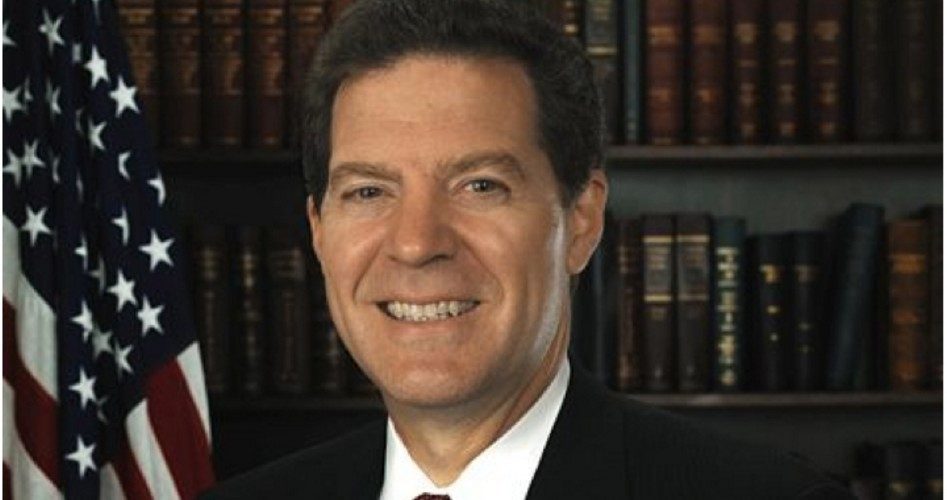
Led by Governor Sam Brownback (shown), the state of Kansas informed the Obama administration this week that it is defying its dictates for Kansas to cooperate in the resettlement of refugees from Syria. In a letter to Robert Carey, director of the Office of Refugee Resettlement, Brownback wrote, “The State of Kansas hereby withdraws its Refugee Resettlement Program State Plan and terminates its participation in all federal refugee resettlement grants and programs, effective at the earliest possible date.”
Brownback added that he was taking his action to “protect the safety and security interests of the State of Kansas.”
Beginning in November 2015, Brownback attempted to work with the federal government to address security concerns related to resettlement of some refugees in Kansas. “We made a reasonable request of the Obama Administration to provide us with information we need to help protect the safety and security of Kansas,” Brownback said. “Because the federal government has failed to provide adequate assurances regarding refugees it is settling in Kansas, we have no option but to end our cooperation with and participation in the federal resettlement program.”
Brownback and several other governors asked the White House in November of last year to share vetting information as President Obama pledged to take in 10,000 Syrian refugees. The administration refused to do so, citing the privacy rights of the refugees!
More than 30 states have expressed some resistance to the plan of importing Syrian refugees, mostly for security concerns. At least two of the Paris terrorists made their way into Europe, claiming to be “refugees” from Syria, which is in the midst of a civil war. The two terrorists entered Greece posing as Syrian refugees in September, made their way to France, where they joined in the preparation, arming, and execution of a massive terrorist attack three months later. A Syrian informant has revealed that over 4,000 ISIS fighters have already been smuggled into Western nations, hiding among “innocent refugees.”
Jeh Johnson, secretary of the Department of Homeland Security (DHS), has admitted, “We don’t know a whole lot” about Syrian refugees now entering America, and that DHS lacks an “active protocol” for properly screening them.
While the 1980 Refugee Act, passed at the urging of President Jimmy Carter, handed over to the federal government great powers in the importation of refugees, the states are considered an essential element in the settlement process. If the states simply refuse to cooperate, it is unlikely that many, if any refugees are likely to be moved to uncooperative states.
Obama is demanding that the states “step up” and do their part in the resettlement of the refugees from Syria.
Maryland Governor Larry Hogan, a Republican, “seeks to halt” resettlement in his state. Democrat Governor Steve Bullock of Montana insists that refugees requesting settlement in Montana will be denied if there are safety concerns. Governor Matt Mead of Wyoming, a Republican, rejects a “lackluster system that allows terrorists to slip through the cracks.”
After Texas Governor Greg Abbott, a Republican, said his state will not accept any Syrian refugees, Robert Carey, director of the Office of Refugee Resettlement (ORR) responded, “States may not deny ORR-funded benefits and services to refugees based on a refugee’s country of origin or religious affiliation. Accordingly, states may not categorically deny ORR-funded benefits and services to Syrian refugees.” He added that states that persist in their refusal are violating the law and “could be subject to enforcement action.”
Texas, like Kansas, was defiant. “The Health and Human Services Commission [of Texas] will continue to follow the directive of Gov. Abbott, which calls for the State of Texas to not participate in the resettlement of Syrian refugees,” responded a spokesman for the commission, Bryan Black.
It is not like Texas has not already admitted refugees in the past. More than 200 Syrian refugees had been resettled in Texas by the end of last August. Overall, 70,000 refugees from 78 countries are living in Houston alone!
Brownback initially attempted to cooperate with the Obama administration, asking more than once for Homeland Security to provide documentation and files on individual refugees, but the Obama administration flatly refused to comply. Brownback explained why he has decided to cease any cooperation with Obama’s plans. “As governor, my priority has been and will continue to be the safety and security of Kansans. Kansas remains a state that has always been welcoming to refugees, but we must take prudent and responsible actions to protect our communities.”
In February, Brownback issued an executive order, directing state agencies to use the official list of the U.S. Department of State of countries identified as state sponsors of terrorism in identifying whether a particular refugee should be deemed to present a safety and security risk. Those nations are Iran, Sudan, and Syria.
The executive order noted “federal charges” were filed in Texas and California against terrorist operatives that entered the United States as refugees, and that such admission of some refugees into Kansas “presents an unacceptable risk to the safety and security of the State of Kansas, and thus State government must take action to ensure that it does not assist in the relocation of such refugees to Kansas from anywhere in the world.”
Because of such concerns, Brownback’s order states, “No department, commission, board, or agency of the government of the State of Kansas shall aid, cooperate with, or assist in any way the relocation of refugees that present a safety and security risk to the State of Kansas, until such time as an adequate vetting process is in place with adequate assurances to the State.”
Brownback explained why he had to resort to defiance. “The State of Kansas has specifically requested, from multiple agencies and levels of the federal government, access to all documentation and files concerning any individual refugee relocated or proposed to be relocated from Syria to Kansas. There has been no response to these requests, which were made directly to the White House, the Department of State, the Department of Homeland Security, and the Office of Refugee Resettlement.”
Brownback made public a letter he had received from Secretary of State John F. Kerry, assuring the Kansas governor that refugees are undergoing a “rigorous security vetting process,” which is “extraordinarily thorough and comprehensive.” According to Kerry, the process is “the most robust screening process for any category of individuals seeking admission into the United States,” and is “multi-layered and intensive.”
In an attempt to persuade Brownback to accept refugees, he cited “the new government of our neighbor to the north, Canada,” which has pledged to accept 25,000 Syrian refugees in 2016. Of course, the new Trudeau government is known as a very liberal one, much like the one in that Kerry serves. Kerry told Brownback that the “at least 10,000″ the Obama administration intends to bring in “this fiscal year” is a “modest commitment.”
And according to Kerry, “The overwhelming majority of Syrian refugees we have accepted and will accept are families, victims of torture, and children.” Whenever they are challenged, liberals often pull out the “children” card, as in “it’s for the children.” Any adult males admitted, Kerry reassured Brownback, will be “especially vulnerable individuals,” such as lesbians, gays, bisexuals, and transgendered individuals. It is supposed to reassure Brownback — Syrian men who think they are women will now be making their way into women’s restrooms?
Kerry then explained the vetting process. First, the refugee candidates are “interviewed by the United Nations High Commission for Refugees; second, a refugee applicant is referred by the UN to the U.S. “along with a packet of information.” Then, the State Department takes over, and they interview the candidate again, providing the U.S. government a “very useful tool for gathering information.” Third, the refugee applicants are then referred to the United States Citizen and Immigration Services (USCIS), where they are subjected to “rigorous status interviews.” The USCIS collects biometric information, including fingerprints for all refugees over the age of 14, or under 79 years of age.
“The burden of proof is on the applicant,” Kerry told Brownback.
Kerry concluded his letter by telling Brownback, “We have tremendous faith in this system’s ability to detect, investigate, and disrupt terrorist plotting in this country, as it has done repeatedly. With these measures in place, we believe that we are able to both protect the American people and maintain this Nation’s long standing position as the world’s beacon of hope and freedom.”
Once the refugees pass this supposedly “rigorous” series of fingerprinting and multiple interviews, Robert Carey of ORR has warned “states may not categorically deny ORR-funded benefits and services to Syrian refugees.” He cited the 1964 Civil Rights Act, which prohibits discrimination on the bases of race and national origin in all programs and activities that receive federal financial assistance. “Thus it is not permissible to deny federally funded benefits such as Medicaid or TANF to refugees who otherwise meet the eligibility requirements.” So, the refugees will quickly become recipients of the vast cornucopia of government benefits paid for by American taxpayers. According to Carey, this is “vital to achieving their potential in the United States and becoming self-sufficient, integrated members of our communities.” And, no doubt, eventually good voting Democrats?
Despite these soothing words that Brownback had nothing to worry about from these Syrian refugees, and if he did not submit there could be “enforcement action,” the Kansas governor persisted in his demand for information on individual refugees being placed in the Sunflower State.
Writing to Denis McDonough, Obama’s chief of staff, on December 31, 2015, Brownback said, “Accordingly, I hereby request on behalf of the State of Kansas a copy of all such documentation and files concerning any individual refugee relocated or proposed to be relocated from Syria to Kansas since November 16, 2015. The state is prepared to enter into an appropriate agreement to maintain the confidentiality and security of these documents.” He sent a nearly identical request to Secretary Kerry on the same day, but both letters were to no avail.
A letter from the State Department again told Brownback that “individual refugee records are considered confidential.”
Finally, on February 24 of this year, Sandra Kimmons of the Kansas Department for Children and Families informed one Syrian refugee that his application for refugee cash assistance had been denied, “as the [Brownback] Administration has requested from multiple agencies of the federal government, access to all documentation and files on any refugees relocated to Kansas from countries listed on the United States Department of State official list of countries determined to be state sponsors of terrorism.”
This precipitated a response from the Administration for Children and Families that Kansas had committed “two apparent violations of federal law.” The letter added that Kansas was not permitted to condition a refugee’s receipt of cash assistance simply because the U.S. government would not provide the information Brownback was demanding. The letter then concluded with the threat that Kansas may have “violated federal civil rights statutes.”
Brownback then made another attempt on March 22 to obtain the information he had previously requested, which he considered “necessary to assure the safety and security of Kansans in connection with refugee resettlement.”
When the federal government followed that up with more threats and denials of the information Brownback desired, the governor wrote to Carey (the director of the Office of Refugee Resettlement), “The State of Kansas hereby withdraws its Refugee Resettlement Program State Plan and terminates its participation in all federal refugee resettlement grants and programs…. As we have informed you previously, this action is being taken to protect the safety and security interests of the State of Kansas.”
Brownback expressed his exasperation at the federal government’s refusal to provide the requested information. “We have been reasonable and incredibly patient in attempting to work with the federal government on this issue. As governor, I must have confidence that the refugee relocation program, and particularly the vetting process, is sufficient to protect our citizens. If I have to choose between the safety and security of Kansans and the relocation of refugees, I will take action to protect Kansans.”
Hopefully, other governors will take the same position as taken by Governor Brownback of Kansas.


